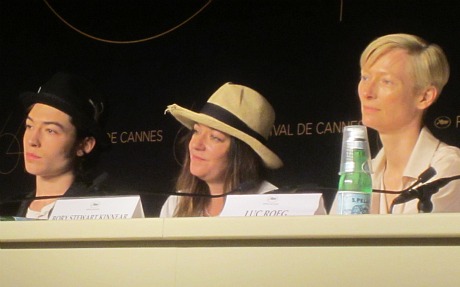Lynne Ramsay‘s We Need To Talk About Kevin is a beautifully painted, radiantly colored, anti-verbal horror film about a sociopathic monster — Ezra Miller‘s Kevin — and how his hatefulness and alien-ness has…well, not much but something to do with his mother (Tilda Swinton ) and father (John C. Reilly), but mainly his mom, who’s bothered by certain proverbial undercurrents but nothing too off-the-charts.

(l. to r.) Ezra Miller, Lynne Ramsay, Tilda Swinton during this morning’s press conference for We Need To Talk About Kevin

(l. to r.) Moderator Annette Insdorf, John C. Reilly, Miller, Ramsay.
This is never explained or filled in, of course. As far as Ramsay’s film is concerned Kevin is just a steely-brained, black-eyed Belezebub who’s been brought to life in order to pour acid into people’s lives. His ultimate acts of destruction happen at the very end, but they’re pretty much anti-climactic given the certainty in the audience’s mind that the only humane and compassionate response to this kid early on would have been to put him in a burlap bag, fill it with rocks and toss it off a pier.
Swinton’s Eva, whom we’re told is a “legendary adventurer” who writes best-selling books, is perplexed, appalled, repelled, guilt-ridden and generally at a loss about what to do with this rancid little fuck or how to get through to him. Reilly’s Franklin is an oblivious dad whose powers of perception are staggering for their absence. For all the recognition and conversation these two share about the obviously malignant nature of their son the movie should have been called Let’s Not Talk About Kevin.
Ramsay’s film, based on Lionel Shriver’s 2003 same-titled novel, is about the freedom she had as the director to revel in visual flourish, and particularly the color red but more than the color — I mean the mad sensual bath that is the oozy, slurpee mashed-tomato red. Ramsay clearly had a ball shooting and cutting this thing, but her lack of interest in making the characters seem even half-recognizable as (I don’t mean to introduce a sore subject) human beings with the ability to think, observe and comprehend is nothing short of breathtaking.
A journalist friend (I’m not using her name in order to show compassion and to protect her reputation) told me she “loved” We Need To Talk About Kevin. She said this right after I’d emerged from the theatre, and all I could say was “you loved it…?” I then muttered something along the lines of “I give up” and walked away. I was emotionally overcome, you see. I was astounded by the ugliness that’s embedded in the soul of this film and all that poison was just leaking out of me and starting to be dissipated as we spoke.
By virtue of Miller’s presence and acting style alone (as well as that of the equally repellent kids who play Kevin at earlier stages of life), We Need To Talk About Kevin is, emotionally speaking, rat poison. Swinton and Reilly’s performances are very good but hampered, as noted, by the fact that they don’t get what’s going on with their son, and their lack of courage in not following the suggestion I made in paragraph #2.


Update: In his positive review, Indiewire’s Eric Kohn states that “Kevin’s issues are clearly related to his mother’s disdain for him, which Ramsay tracks all the way back to the crib. As she forces a grin while the baby can’t stop crying, Eva looks like she has a little bit of a maniac side to her as well.”
No…no. What’s clear is that Swinton’s Eva isn’t delighted with motherhood, but she gives it what she has to give. News flash #1: The world is full of parents who (like my dad) have realized early on they weren’t exactly cut out for it but have given it the old college try, and guess what? Their kids might be hurt by this but they don’t turn into Damien: Omen V.
The film does make it especially clear that Swinton isn’t happy with the experience of giving birth. News flash #2: No mother ever has been. It also shows Eva doing badly with a constantly wailing baby due to colic syndrome. News flash #3: Every parent in the history of the universe with a colic-y baby has known a form of madness. My son Dylan’s colic-y condition amounted to psychological torture that I became very resentful of as the weeks wore on, and yet somehow Dylan never sensed my inner resentment about this and used it to further his transition into a permanently dark and demonic psychology on his road to becoming a high-school mass murderer. I don’t know why he didn’t grow up to kill me and his brother and a portion of his high school class a la Harris/Klebold, but he didn’t. He did, however, become a hugely talented artist.
